-
 Bitcoin
Bitcoin $88,555.6766
1.18% -
 Ethereum
Ethereum $1,626.4043
-1.22% -
 Tether USDt
Tether USDt $0.9998
-0.01% -
 XRP
XRP $2.1018
-1.27% -
 BNB
BNB $605.8750
0.04% -
 Solana
Solana $140.3422
0.04% -
 USDC
USDC $0.9999
0.00% -
 Dogecoin
Dogecoin $0.1643
1.27% -
 TRON
TRON $0.2481
1.05% -
 Cardano
Cardano $0.6359
-1.63% -
 Chainlink
Chainlink $13.3216
-2.53% -
 UNUS SED LEO
UNUS SED LEO $9.1797
-2.79% -
 Avalanche
Avalanche $20.3681
-2.52% -
 Stellar
Stellar $0.2473
-4.43% -
 Sui
Sui $2.3043
2.50% -
 Shiba Inu
Shiba Inu $0.0...01257
-1.15% -
 Toncoin
Toncoin $2.9429
-3.48% -
 Hedera
Hedera $0.1738
0.16% -
 Bitcoin Cash
Bitcoin Cash $347.0587
1.49% -
 Hyperliquid
Hyperliquid $18.2576
-0.35% -
 Litecoin
Litecoin $79.8456
-0.89% -
 Polkadot
Polkadot $3.7809
-4.73% -
 Dai
Dai $0.9999
-0.01% -
 Bitget Token
Bitget Token $4.4439
-0.50% -
 Ethena USDe
Ethena USDe $0.9991
-0.01% -
 Pi
Pi $0.6313
-0.96% -
 Monero
Monero $216.2035
0.57% -
 Pepe
Pepe $0.0...08138
3.46% -
 Uniswap
Uniswap $5.3889
-1.68% -
 OKB
OKB $50.9281
-0.23%
How to choose a suitable exchange for Ethereum spot trading?
Choosing an Ethereum exchange requires prioritizing security (cold storage, 2FA), liquidity (order book depth, trading volume), and low fees, while also considering user interface, regulation, and customer support.
Feb 27, 2025 at 11:00 pm
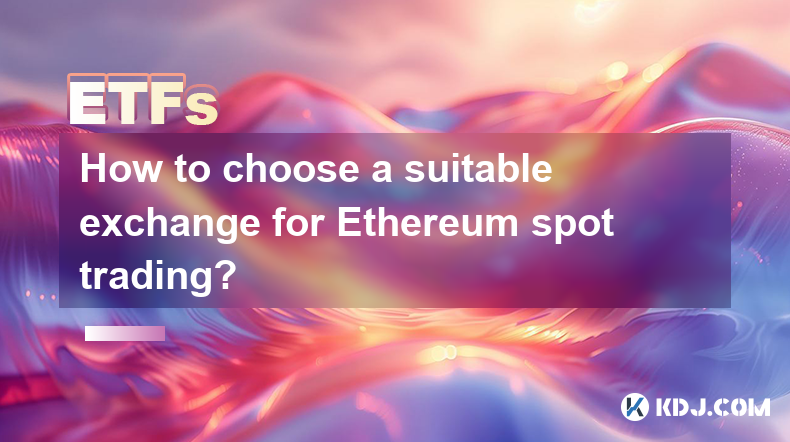
How to Choose a Suitable Exchange for Ethereum Spot Trading?
Key Points:
- Security: Prioritize exchanges with robust security measures, including cold storage, two-factor authentication (2FA), and a proven track record of resisting hacks. We'll delve into the specific aspects of security to consider.
- Liquidity: High liquidity ensures you can buy or sell ETH quickly at fair prices. We will explore how to assess an exchange's liquidity and its impact on your trading experience.
- Fees: Trading fees, deposit fees, and withdrawal fees vary significantly across exchanges. We'll compare fee structures and identify ways to minimize your costs.
- User Interface and Experience: A user-friendly interface is crucial for a smooth trading experience. We'll discuss the importance of intuitive design and helpful features.
- Regulation and Compliance: Choosing a regulated exchange can offer added protection and assurance. We'll explain the benefits of regulatory compliance and how to identify it.
- Available Features: Consider advanced order types, charting tools, and research resources offered by the exchange. We'll explore the various features and their value to different traders.
- Customer Support: Reliable customer support is essential for resolving issues and obtaining assistance. We will discuss the importance of readily available and responsive support channels.
Choosing the Right Ethereum Spot Trading Exchange: A Detailed Guide
The cryptocurrency market is dynamic and competitive. Selecting the appropriate exchange for your Ethereum (ETH) spot trading needs is a crucial decision impacting your security, profitability, and overall trading experience. This guide explores the key factors to consider when making this choice.
- Security: The Cornerstone of a Reliable Exchange
Security should be your paramount concern when choosing an Ethereum spot trading exchange. A compromised exchange can lead to the loss of your funds, highlighting the need for rigorous due diligence. Here's what to look for:
- Cold Storage: Reputable exchanges store the vast majority of their users' funds in offline "cold storage" wallets. This significantly reduces the risk of hacking, as these wallets are not connected to the internet. Look for exchanges that transparently communicate their cold storage practices and percentages. Examine their security audits and reports from independent security firms. A lack of transparency regarding cold storage should raise significant red flags.
- Two-Factor Authentication (2FA): 2FA adds an extra layer of security by requiring a second verification method beyond your password, typically a code generated by an authenticator app on your smartphone. This prevents unauthorized access even if your password is compromised. Ensure the exchange supports multiple 2FA options, such as Google Authenticator, Authy, or YubiKey. Verify that 2FA is mandatory for all accounts.
- Hacking History and Reputation: Research the exchange's history. Have they experienced any significant security breaches or hacks in the past? A clean track record indicates a commitment to security. Read reviews and forums to gauge the community's perception of the exchange's security measures. Look for evidence of proactive security updates and improvements. An exchange with a history of security incidents should be approached with caution.
- Insurance and Compensation Funds: While not a guarantee against loss, some exchanges offer insurance or compensation funds to protect users in the event of a security breach. Inquire about the existence and scope of such programs. Understand the limitations and conditions associated with any compensation offered.
- Liquidity: Ensuring Smooth and Efficient Trading
Liquidity refers to the ease with which you can buy or sell ETH without significantly impacting the price. High liquidity is crucial for executing trades quickly and at fair prices. A lack of liquidity can result in slippage (buying or selling at a less favorable price than expected) and difficulty filling large orders.
- Order Book Depth: Examine the exchange's order book, which displays the number of buy and sell orders at various price levels. A deep order book indicates high liquidity, as there are many orders available to match your trade. A shallow order book suggests low liquidity and potential for price slippage.
- Trading Volume: High trading volume generally signifies high liquidity. Check the exchange's reported trading volume for ETH. However, be aware that some exchanges may inflate their reported volumes, so it's important to cross-reference with other sources. Consider the volume relative to the overall ETH market volume to gauge the exchange's market share and influence.
- Spread: The spread is the difference between the bid price (what buyers are willing to pay) and the ask price (what sellers are asking). A narrower spread indicates higher liquidity, as buyers and sellers are closer in price. A wide spread suggests lower liquidity and potentially higher transaction costs. Compare spreads across different exchanges to identify those with the most competitive pricing.
- Fees: Minimizing Transaction Costs
Trading fees can significantly impact your profitability. Carefully compare the fee structures of different exchanges before making a decision.
- Trading Fees: These are the fees charged for each trade you execute. Fees can be based on a percentage of the trade value (maker/taker fees) or a fixed fee. Maker fees are typically lower than taker fees, rewarding users who add liquidity to the order book. Taker fees are charged to those who remove liquidity by taking existing orders.
- Deposit Fees: Some exchanges charge fees for depositing ETH. Check whether the exchange charges fees for depositing ETH from different networks (e.g., ETH, ERC-20). Compare deposit fees across different exchanges to minimize costs.
- Withdrawal Fees: Withdrawal fees are charged for transferring ETH out of the exchange to your personal wallet. These fees vary depending on the network used and the destination wallet. Consider the withdrawal fees when comparing exchanges. Look for exchanges with low or competitive withdrawal fees, especially if you plan on frequent withdrawals.
- User Interface and Experience: Navigating the Platform with Ease
A user-friendly interface is crucial for a smooth trading experience. A poorly designed interface can be frustrating and time-consuming, impacting your ability to make timely trading decisions.
- Intuitive Design: The exchange's platform should be easy to navigate, with clearly labeled buttons and menus. Look for a clean and uncluttered design that makes it easy to find the information you need. Test the platform's usability before committing to it. Consider the overall user experience and how intuitive it is for placing orders, viewing charts, and managing your portfolio.
- Charting Tools: Robust charting tools are essential for technical analysis. Check if the exchange provides integrated charting tools with various indicators and drawing tools. Evaluate the quality and functionality of the charting tools to ensure they meet your analytical needs. Consider whether the charting tools are customizable and offer different chart types.
- Order Types: A variety of order types allows you to customize your trading strategies. Look for exchanges that support limit orders, market orders, stop-loss orders, and other advanced order types. The availability of advanced order types can significantly enhance your trading capabilities and risk management.
- Mobile App: A well-designed mobile app allows you to trade on the go. Check if the exchange offers a mobile app for both iOS and Android devices. Assess the usability and functionality of the mobile app, ensuring it provides the same features and performance as the desktop platform.
- Regulation and Compliance: Protecting Your Investments
Operating in a regulated environment adds a layer of protection for users. Regulated exchanges are subject to stricter compliance standards, reducing the risk of fraud and mismanagement.
- Regulatory Status: Research the exchange's regulatory status. Is it licensed and regulated by a reputable financial authority? Operating in a regulated jurisdiction provides a degree of protection for users. Check the exchange's compliance with Know Your Customer (KYC) and Anti-Money Laundering (AML) regulations.
- Compliance History: Has the exchange been involved in any regulatory investigations or penalties? A clean compliance record indicates a commitment to adhering to regulations. Check for any public statements or news articles about the exchange's regulatory compliance. Transparency in regulatory matters is crucial.
- Available Features: Enhancing Your Trading Capabilities
Beyond the basics, consider the advanced features offered by the exchange to enhance your trading experience.
- Research Tools: Access to market data, research reports, and analytical tools can significantly improve your trading decisions. Check if the exchange provides access to market news, research reports, or other analytical resources. Consider the quality and relevance of the information provided.
- API Access: API access allows you to integrate the exchange with your own trading bots or algorithms. If you plan to use automated trading strategies, check if the exchange offers a robust and well-documented API. Evaluate the API's reliability, performance, and security features.
- Staking and Lending: Some exchanges offer staking and lending services, allowing you to earn passive income on your ETH holdings. If you are interested in earning passive income, consider exchanges that offer staking and lending options with competitive interest rates. Be aware of the risks associated with staking and lending, such as smart contract vulnerabilities and potential loss of funds.
- Customer Support: Addressing Issues and Obtaining Assistance
Reliable customer support is crucial for resolving issues and obtaining assistance when needed.
- Responsiveness: Test the responsiveness of the exchange's customer support channels. How quickly do they respond to inquiries? Check the various support channels offered, such as email, live chat, and phone support. Look for reviews and feedback regarding the quality of customer support. A history of poor customer service should be a significant concern.
- Accessibility: Ensure the customer support channels are easily accessible and convenient to use. Consider the availability of multilingual support. Check the availability of support documentation, FAQs, and tutorials. Look for a comprehensive help center with readily available information.
FAQs
Q: What is Ethereum spot trading?
A: Ethereum spot trading involves buying and selling ETH at the current market price for immediate delivery. It differs from futures or options trading, where you are buying or selling a contract for future delivery.
Q: Are there any free Ethereum exchanges?
A: While some exchanges may advertise "free" trading, they typically generate revenue through other means, such as fees on deposits, withdrawals, or other services. Most exchanges charge trading fees.
Q: How do I choose between centralized and decentralized exchanges (CEXs and DEXs)?
A: CEXs offer greater convenience and liquidity but carry higher security risks. DEXs offer greater security and privacy but can have lower liquidity and higher transaction fees. The choice depends on your priorities.
Q: What is the significance of regulatory compliance for an Ethereum exchange?
A: Regulatory compliance ensures the exchange operates within legal boundaries, protecting users from fraud and enhancing transparency. Choosing a regulated exchange offers a degree of protection.
Q: How can I assess the security of an Ethereum exchange?
A: Assess security by looking at cold storage practices, two-factor authentication options, security audits, and the exchange's history of security breaches. Transparency in security practices is crucial.
Q: What are the different types of fees charged by Ethereum exchanges?
A: Fees include trading fees (maker/taker), deposit fees, and withdrawal fees. These fees can significantly impact profitability, so careful comparison is essential.
Q: What is liquidity, and why is it important in Ethereum spot trading?
A: Liquidity refers to the ease with which you can buy or sell ETH without impacting the price. High liquidity ensures quick and efficient trades at fair prices. Low liquidity can lead to slippage.
Q: What are the key features to consider in an Ethereum exchange's user interface?
A: Key features include intuitive design, robust charting tools, a variety of order types, and a user-friendly mobile app. A well-designed interface enhances the trading experience.
Disclaimer:info@kdj.com
The information provided is not trading advice. kdj.com does not assume any responsibility for any investments made based on the information provided in this article. Cryptocurrencies are highly volatile and it is highly recommended that you invest with caution after thorough research!
If you believe that the content used on this website infringes your copyright, please contact us immediately (info@kdj.com) and we will delete it promptly.
- Bitget Exploited: Market-Maker Bot Glitch Triggers $100M Trading Frenzy, Turning $VOXEL into a Crypto Storm
- 2025-04-22 16:40:12
- MANTRA CEO John Patrick Mullin announces plans to burn 300 million OM tokens to stabilize market price after recent massive price crash.
- 2025-04-22 16:40:12
- What is Hyperlane? It is a framework for enabling interoperability among different blockchain networks
- 2025-04-22 16:35:12
- Mantra Burns 16.5% of Its Total Supply to Boost Staking Rewards
- 2025-04-22 16:35:12
- Why Is Polygon (POL) Price Up?
- 2025-04-22 16:30:13
- Can Cardano's Triangle Breakout Drive ADA Price Higher?
- 2025-04-22 16:30:13
Related knowledge
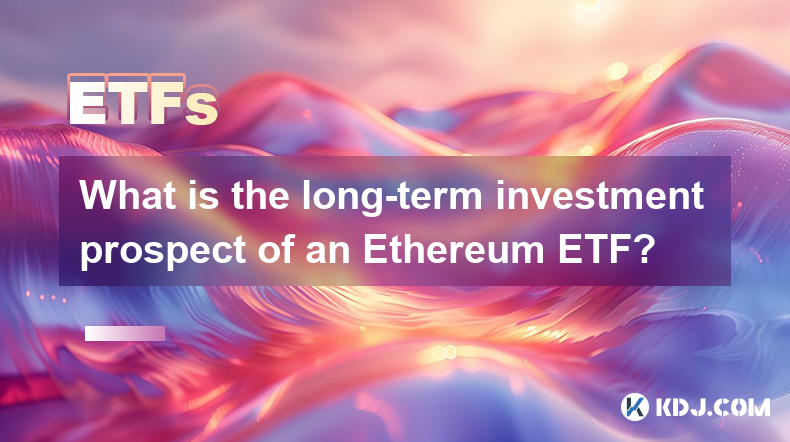
What is the long-term investment prospect of an Ethereum ETF?
Mar 18,2025 at 03:01pm
Key Points:Uncertainty surrounds the long-term prospects of an Ethereum ETF due to regulatory hurdles and market volatility.Approval hinges on regulatory clarity regarding cryptocurrencies, especially concerning investor protection and market manipulation.Successful ETF launches could boost Ethereum's price and adoption, but failure could negatively imp...
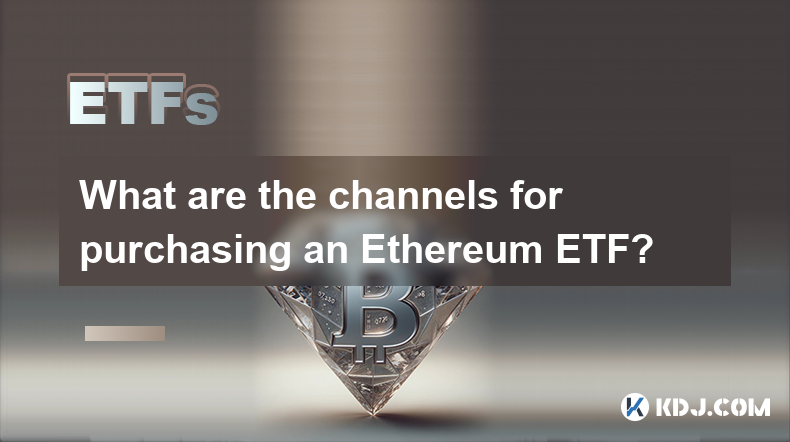
What are the channels for purchasing an Ethereum ETF?
Mar 18,2025 at 01:49am
Key Points:Currently, there are no Ethereum ETFs available for direct purchase by the general public in most major markets.Access to Ethereum exposure through ETFs is limited, mainly through futures-based ETFs.Purchasing Ethereum directly or through other investment vehicles remains a viable alternative.Regulatory hurdles and market complexities signifi...
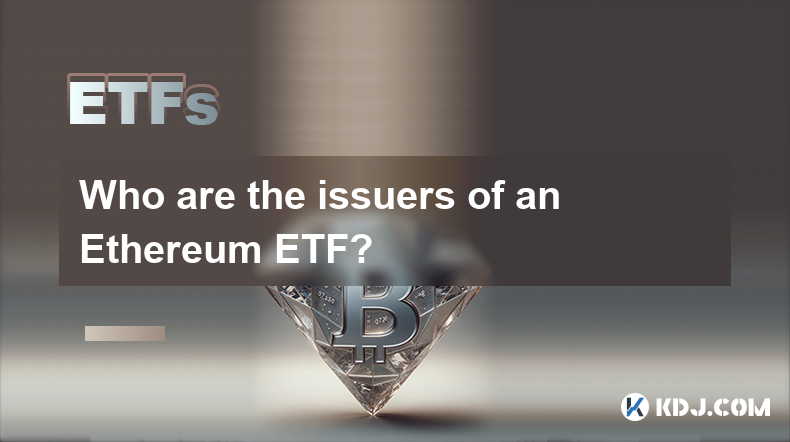
Who are the issuers of an Ethereum ETF?
Mar 19,2025 at 08:07pm
Key Points:There are no currently approved Ethereum ETFs in the US, meaning no single issuer can be definitively named. However, several firms have filed applications.The issuers of potential Ethereum ETFs will be large, established financial institutions, typically asset management companies.The specific requirements for ETF issuers are stringent and o...
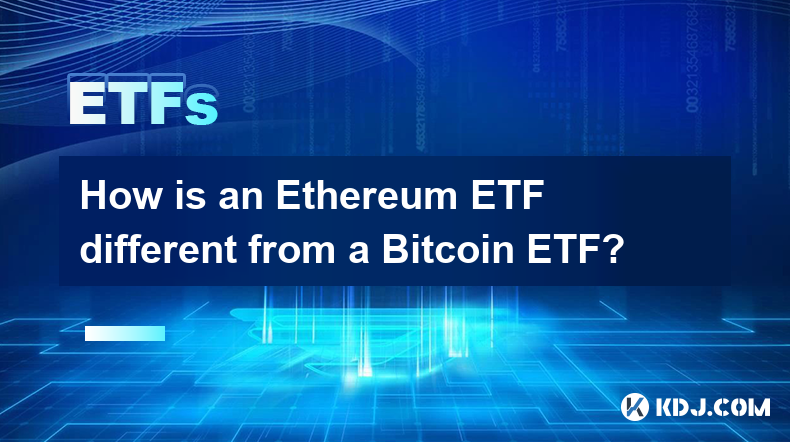
How is an Ethereum ETF different from a Bitcoin ETF?
Mar 17,2025 at 10:55am
Key Points:Underlying Asset: The core difference lies in the underlying asset: an Ethereum ETF tracks the price of Ether (ETH), while a Bitcoin ETF tracks the price of Bitcoin (BTC).Technology and Use Cases: Ethereum's blockchain supports smart contracts and decentralized applications (dApps), creating a distinct technological and investment narrative c...
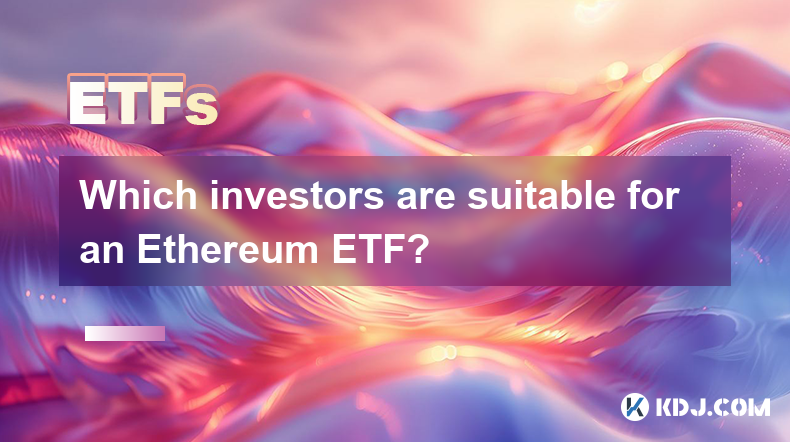
Which investors are suitable for an Ethereum ETF?
Mar 16,2025 at 05:50pm
Key Points:Risk Tolerance: Ethereum ETF investment requires a high risk tolerance due to the volatility of the cryptocurrency market.Investment Goals: Investors seeking long-term growth potential and exposure to the Ethereum ecosystem are suitable candidates.Investment Horizon: A longer-term investment horizon is crucial to weather market fluctuations.U...
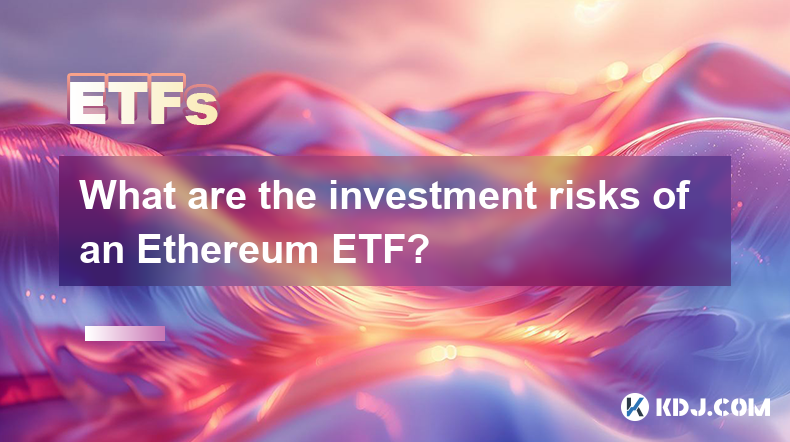
What are the investment risks of an Ethereum ETF?
Mar 18,2025 at 02:12am
Key Points:Price Volatility: Ethereum's price is highly volatile, impacting ETF share prices.Regulatory Uncertainty: Changes in regulatory landscapes can significantly affect ETF trading and performance.Market Manipulation: The potential for market manipulation, particularly in smaller ETFs, exists.Underlying Asset Risk: Risks associated with the Ethere...

What is the long-term investment prospect of an Ethereum ETF?
Mar 18,2025 at 03:01pm
Key Points:Uncertainty surrounds the long-term prospects of an Ethereum ETF due to regulatory hurdles and market volatility.Approval hinges on regulatory clarity regarding cryptocurrencies, especially concerning investor protection and market manipulation.Successful ETF launches could boost Ethereum's price and adoption, but failure could negatively imp...

What are the channels for purchasing an Ethereum ETF?
Mar 18,2025 at 01:49am
Key Points:Currently, there are no Ethereum ETFs available for direct purchase by the general public in most major markets.Access to Ethereum exposure through ETFs is limited, mainly through futures-based ETFs.Purchasing Ethereum directly or through other investment vehicles remains a viable alternative.Regulatory hurdles and market complexities signifi...

Who are the issuers of an Ethereum ETF?
Mar 19,2025 at 08:07pm
Key Points:There are no currently approved Ethereum ETFs in the US, meaning no single issuer can be definitively named. However, several firms have filed applications.The issuers of potential Ethereum ETFs will be large, established financial institutions, typically asset management companies.The specific requirements for ETF issuers are stringent and o...

How is an Ethereum ETF different from a Bitcoin ETF?
Mar 17,2025 at 10:55am
Key Points:Underlying Asset: The core difference lies in the underlying asset: an Ethereum ETF tracks the price of Ether (ETH), while a Bitcoin ETF tracks the price of Bitcoin (BTC).Technology and Use Cases: Ethereum's blockchain supports smart contracts and decentralized applications (dApps), creating a distinct technological and investment narrative c...

Which investors are suitable for an Ethereum ETF?
Mar 16,2025 at 05:50pm
Key Points:Risk Tolerance: Ethereum ETF investment requires a high risk tolerance due to the volatility of the cryptocurrency market.Investment Goals: Investors seeking long-term growth potential and exposure to the Ethereum ecosystem are suitable candidates.Investment Horizon: A longer-term investment horizon is crucial to weather market fluctuations.U...

What are the investment risks of an Ethereum ETF?
Mar 18,2025 at 02:12am
Key Points:Price Volatility: Ethereum's price is highly volatile, impacting ETF share prices.Regulatory Uncertainty: Changes in regulatory landscapes can significantly affect ETF trading and performance.Market Manipulation: The potential for market manipulation, particularly in smaller ETFs, exists.Underlying Asset Risk: Risks associated with the Ethere...
See all articles























































































